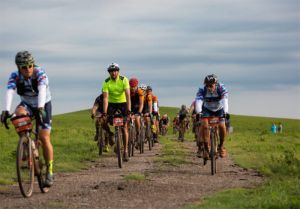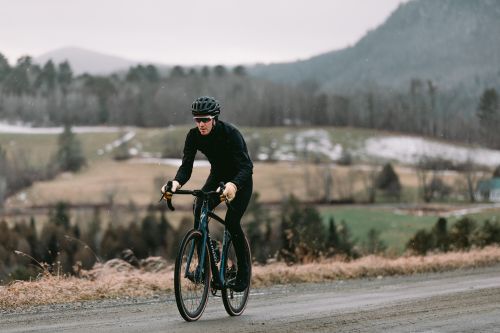By Betsy Welch
BENTONVILLE, Ark. (BRAIN) — Like several pro road racers, USA Cycling has its eye on gravel.
Last week, officials from the national governing body met with representatives from some of gravel cycling's biggest events here. The goal was to create an official dialogue between USAC and the racing scene that has, thus far, grown up outside of the national governing body's umbrella of influence. The event was the brainchild of Tim Johnson, the development director for the USA Cycling Foundation.
“People are registering to do these events in droves,” Johnson told VeloNews. “Gravel is on the tip of everyone’s tongue. There’s a lot to be said from learning from the people who are out there doing it and putting in the work.”
Johnson led the USAC delegation that included CEO Rob DeMartini; present from the gravel world were organizers of the Dirty Kanza 200, SBT GRVL, Grinduro, the Grasshopper Adventure Series, among other events.
According to Laura King, co-director of the Rooted Vermont race, the meeting marked the first time that many of the gravel promoters had all met in the same room.
“The portion of talking about USA Cycling was actually quite short, maybe one hour,” King said. “The rest of the time together was focused on knowledge sharing, tackling issues that we as race directors face, and discussing the path we hope to see gravel take.”
Gravel cycling's rapid growth has generated headlines over the past several years, with the Dirty Kanza switching to a lottery-style registration in 2018 due to the influx of registrants. In November, the new Big Sugar race sold out its 1,000 spots in four minutes, while SBTGRVL sold out all 2,500 spots in 25 minutes during its December registration. Smaller, less prestigious events are experiencing tremendous growth, as well, as people’s thirst for the community and challenge of gravel continues unabated.
 During the presentation, officials said there are now 700 gravel events on the competition calendar for 2020.
During the presentation, officials said there are now 700 gravel events on the competition calendar for 2020.
“If I were a young rider, I’d be wanting to ride my bike in events just like these,” Johnson said. “At USAC, we have a renewed sense of servicing the community, and gravel definitely fits into that.”
In contrast to gravel’s explosive growth, USAC’s paid membership has been flat in recent years. USAC is hoping to significantly grow that number for 2020 and beyond. On Monday, the SportsBusiness Journal reported that USAC will launch a major marketing push over the next three years aimed at dramatically increasing its membership.
So, how does gravel fit into this plan?
Gravel cycling's success has, thus far, come outside of the umbrella of USAC, and many of the marquee events have rejected the category-specific competition formats and licensing fees associated with USAC inscription. Many gravel races boast mass-start formats and operate without official USAC referees. The fact that so many of gravel cycling’s most beloved events have grown up outside the realm of the governing body presented an initial sticking point at the Bentonville gathering.
“There was definitely a sense of protecting the events,” said Nat Ross, co-promoter of the year’s inaugural The Big Sugar race. "A bit of, ‘Hey, we’re trying to keep the gravel side of things gravel.’ Folks were definitely wondering what the messaging was here.”
According to participants at the event, USAC leaders said they have no plans to change gravel race formats, or to alter the ways in which they are held. Instead, the governing body believes it can bring its own participant base to the events and improve the overall experience of participants.
“[DeMartini] told us he doesn’t intend to come in and try and sanction gravel,” King said. “Instead, he wants us to understand how he might work with us to deliver a value to the USAC membership and license holders.”
Members of the gravel community who traveled to Bentonville said they appreciated USAC’s interest in their events but also relieved that the governing body wasn’t there to force an agenda or deliver a plan.
“The point wasn’t to have an answer in two short days,” said LeLan Dains, co-director of the Dirty Kanza. “It was a starting point.”
For now, it seems, gravel races will continue to operate outside of USAC's oversight, and under the direct supervision of the event promoters and directors. After the gathering in Bentonville, it was clear that this is the preferred trajectory of both the race directors and USAC.
“The people in the room are experts at what they’re doing, and they’re doing a great job,” Johnson said. “That’s the real basis of our focus: where gravel is, and what it’s doing.”
Editor's note: Welch is a senior editor at VeloNews. VeloNews, like BRAIN, is owned by Pocket Outdoor Media.


